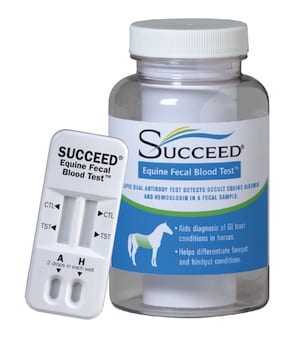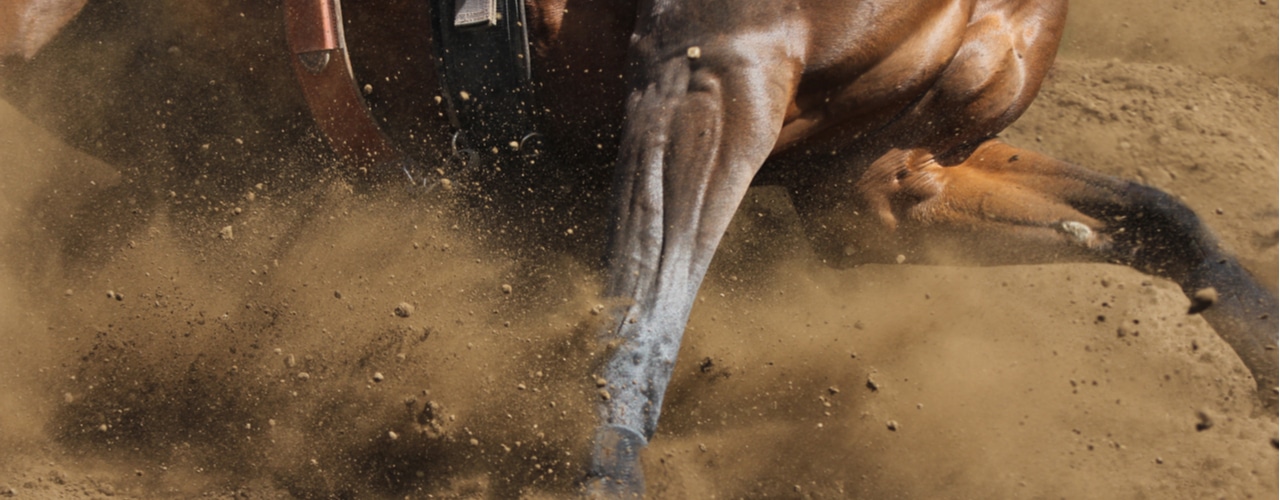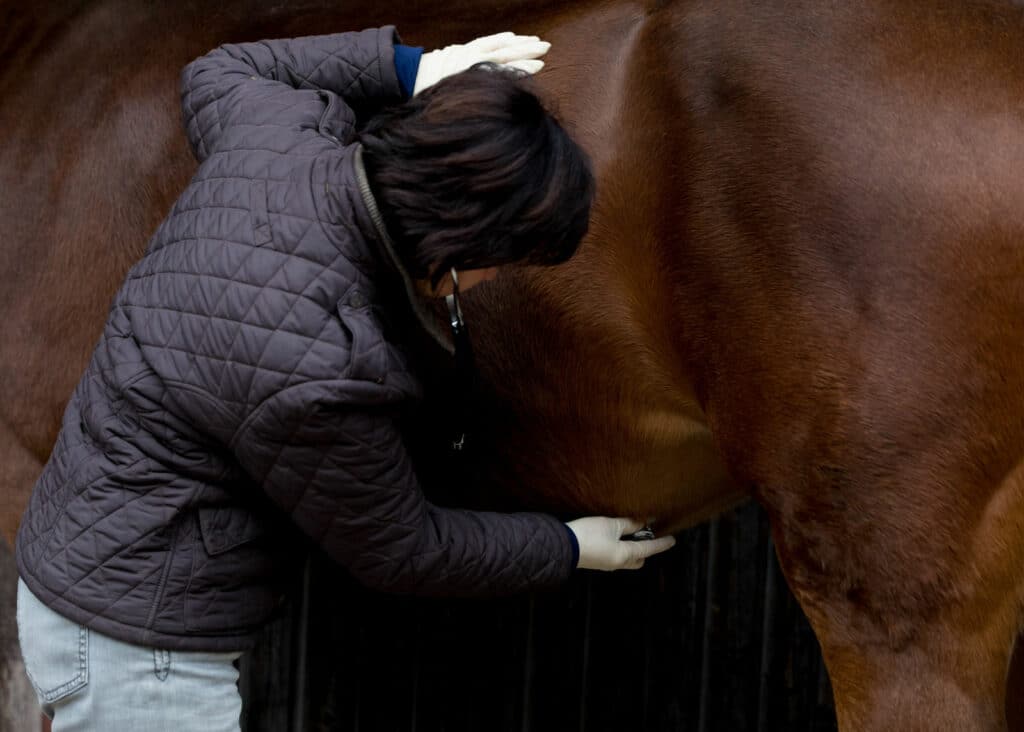Barrel horses are notoriously sensitive. Perhaps this is a necessity to achieve those quick bursts of speed and impressively tight turns required to shave seconds off the clock in such a highly contested sport. But sensitive horses are also more prone to stress-related health issues. So barrel horse owners must pay special attention to careful diet and management.
Low-starch, high-forage diets, excellent veterinary care, regular chiropractic care, massotherapy, and joint maintenance are common among serious barrel competitors focused on horse health.
Even with the best care, though, barrel horse owners still can find their equine partners plagued with digestive health struggles—most commonly ulcers.
Here’s what you need to know about recognizing and managing ulcers in barrel horses, or in any high-stress competition horse across disciplines.
Equine Ulcer Symptoms Vary Widely
The obvious clinical signs of a digestive health problem in horses include:
- Loss of appetite
- Weight loss and/or poor body condition
- Diarrhea/loose stools
- Poor hair coat
- Chronic colic
Keep in mind that these symptoms are general to the whole of the digestive tract and GI conditions. While diarrhea always results from a hindgut issue, the others could originate from anywhere in the GI tract for any number of reasons. Gastric ulcers just happen to be common, the easiest to diagnose, and the most well understood.
Other problems that may indicate a GI problem (or training or another issue) include:
- Cribbing or stall weaving
- Resistance under saddle, even un-rideability
- Irritability and attitude issues
- Discomfort being groomed
- Cinchy behavior
- Underperforming
Owners in online barrel horse forums and social media groups commonly share that their horses developed resistance, attitude, and rideability issues, which their vets, after scoping or administering a treatment approach, then diagnosed as gastric ulcers.
And if all this doesn’t make ulcers hard enough to recognize, horses can be also asymptomatic. Other barrel horse owners shared that horses on a forage-only diet with no physical or mental issues have been scoped and found to have bleeding ulcers!
So, horses with no symptoms, mild symptoms, or obvious signs of GI tract issues could all be suffering from ulcers, despite the wonderful care you give them. So what’s to be done?
The Trouble With Treating Gastric Ulcers
Some veterinarians recommend always scoping a horse to confirm a gastric ulcer diagnosis. Others recommend treatment as a diagnosis, meaning that you treat it as if it does have ulcers and if the horse improves then it probably did.
Either way your veterinarian leans, the problem is that treating with acid-suppression (proton pump inhibitor or PPI) medicines like omeprazole provides only a short-term solution. Even with a confirmed diagnosis, the ulcers often return when treatment stops. And PPIs are not recommended for long-term use as they inhibit the natural functioning of the GI tract and can cause other issues for digestive health.
The other problem with treating gastric ulcers is that your horse may actually have hindgut ulcers instead, or perhaps it has both. Studies have found prevalence rates in performance horses of:
- 87% gastric ulcers
- 63% colonic ulcers
- 54% both gastric and colonic ulcers
Colonic ulcers, or ulcers in the hindgut, are more difficult, but not impossible, to diagnose. They have several possible causes, ranging from overuse of NSAIDs, parasite burden, or hindgut acidosis usually as a result of large grain feeds (more than 4-5 lbs per feed). In truth, underlying causes of hindgut ulceration are not entirely well known, but the common care, feeding, and overall husbandry associated with performance horses is a significant contributor.
Further, the presence and location of ulcers can be challenging to pinpoint. Even if you can confirm that your horse has ulcers, treating with the commonly recommended PPIs doesn’t provide a lasting solution, and may actually be the wrong solution if the horse is suffering from colonic ulcers. Is this a risk you’re willing to take?
A Better Way to Keep Equine Ulcers at Bay

Many of the equine veterinarians we’ve worked with over the years do recommend scoping to confirm a gastric ulcer diagnosis before treating. However, even if gastric ulcers are confirmed, the diagnosis should not stop there.
The SUCCEED Equine Fecal Blood Test is a non-invasive, inexpensive, and quick stall-side tool that your veterinarian can use to identify the presence of lesions in the horse’s hindgut. The FBT uses antibodies that can detect the presence of albumin and hemoglobin, components of blood, in a fresh stool sample. A positive result for albumin indicates a problem specifically in the hindgut.
Your vet will need to then take additional steps to diagnose the specific condition, as a positive result indicates that a problem exists, but not what the problem is (much like how a thermometer indicates you have a fever). If your horse has been diagnosed with gastric ulcers, we recommend running the FBT to check its hindgut too. And any time you are concerned about your horse’s digestive health in general, asking your vet to test with the FBT is a great place to start to get directional information. Learn more about the FBT here. >
Treating gastric ulcers with the commonly prescribed PPIs is important for helping the horse’s digestive tract to heal in the short run. However, you also need to take additional steps to support and manage digestive health for the long-term, or you’re likely to get stuck in a diagnose-treat-repeat cycle.
Reducing starchy feeds, increasing turnout and forage, feeding free-access forage, and feeding smaller meals more often are all important for encouraging good digestive health in horses. Alfalfa is also commonly fed to help reduce acidity in the horse’s stomach. As many barrel horse owners share, though, these are not always enough to keep ulcers at bay.
You should also feed your horses daily digestive support on an ongoing basis to support the health of the entire gastrointestinal tract. Look for products high in these components that research shows support GI health:
- Polar lipids: shown to assist with nutrient absorption, strength and integrity of the intestinal mucosa barrier, and normal brain function.
- Beta glucan: shown to be useful for maintaining a healthy rate at which food moves through the digestive tract, regulating the release of sugars from the digestive system, and supporting natural immunity.
- MOS: supports a balanced microbiota and a healthy immune system response.
- Nucleotides: essential to cell growth and repair and help maintain a healthy intestinal tract while beta glucan protects the hindgut.
- L-glutamine: provides fuel for intestinal epithelial cells (which make up the first layer of the gut lining) and assists with nutrient absorption. It also strengthens and helps to reconstitute the mucosal barrier.
- L-threonine: contributes to a smoothly functioning GI tract. It also assists metabolism and nutrient absorption while also contributing to mucus production.
Learn more about how you can support your barrel horse’s digestive health risk-free.
As the person most familiar with your horse’s individual needs, it’s important to have your veterinarian’s input on how you manage your horses. We want to make it easy for you and your practitioner to access the information you need about SUCCEED products to make the right decisions for your horse’s care. Connect us with your veterinary practitioner and we’ll send them a short email with product information, trial data, and research.
Related Articles We Think You’ll Enjoy
- Professional Barrel Racer Cheyenne Wimberley’s Story
- Complete Guide to Gastric Ulcers in Horses
- What is Colitis in Horses
- The Microbiota in Horse Health and Disease




